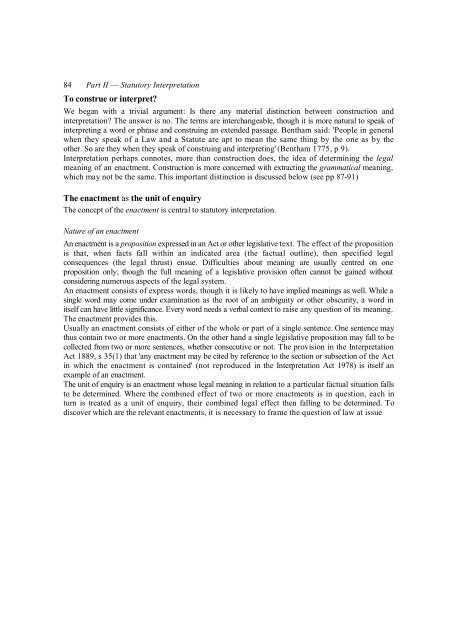Statutory Interpretation The Technique of Statutory ... - Francis Bennion
Statutory Interpretation The Technique of Statutory ... - Francis Bennion
Statutory Interpretation The Technique of Statutory ... - Francis Bennion
You also want an ePaper? Increase the reach of your titles
YUMPU automatically turns print PDFs into web optimized ePapers that Google loves.
84 Part II — <strong>Statutory</strong> <strong>Interpretation</strong><br />
To construe or interpret?<br />
We began with a trivial argument: Is there any material distinction between construction and<br />
interpretation? <strong>The</strong> answer is no. <strong>The</strong> terms are interchangeable, though it is more natural to speak <strong>of</strong><br />
interpreting a word or phrase and construing an extended passage. Bentham said: 'People in general<br />
when they speak <strong>of</strong> a Law and a Statute are apt to mean the same thing by the one as by the<br />
other. So are they when they speak <strong>of</strong> construing and interpreting' (Bentham 1775, p 9).<br />
<strong>Interpretation</strong> perhaps connotes, more than construction does, the idea <strong>of</strong> determining the legal<br />
meaning <strong>of</strong> an enactment. Construction is more concerned with extracting the grammatical meaning,<br />
which may not be the same. This important distinction is discussed below (see pp 87-91)<br />
<strong>The</strong> enactment as the unit <strong>of</strong> enquiry<br />
<strong>The</strong> concept <strong>of</strong> the enactment is central to statutory interpretation.<br />
Nature <strong>of</strong> an enactment<br />
An enactment is a proposition expressed in an Act or other legislative text. <strong>The</strong> effect <strong>of</strong> the proposition<br />
is that, when facts fall within an indicated area (the factual outline), then specified legal<br />
consequences (the legal thrust) ensue. Difficulties about meaning are usually centred on one<br />
proposition only, though the full meaning <strong>of</strong> a legislative provision <strong>of</strong>ten cannot be gained without<br />
considering numerous aspects <strong>of</strong> the legal system.<br />
An enactment consists <strong>of</strong> express words, though it is likely to have implied meanings as well. While a<br />
single word may come under examination as the root <strong>of</strong> an ambiguity or other obscurity, a word in<br />
itself can have little significance. Every word needs a verbal context to raise any question <strong>of</strong> its meaning.<br />
<strong>The</strong> enactment provides this.<br />
Usually an enactment consists <strong>of</strong> either <strong>of</strong> the whole or part <strong>of</strong> a single sentence. One sentence may<br />
thus contain two or more enactments. On the other hand a single legislative proposition may fall to be<br />
collected from two or more sentences, whether consecutive or not. <strong>The</strong> provision in the <strong>Interpretation</strong><br />
Act 1889, s 35(1) that 'any enactment may be cited by reference to the section or subsection <strong>of</strong> the Act<br />
in which the enactment is contained' (not reproduced in the <strong>Interpretation</strong> Act 1978) is itself an<br />
example <strong>of</strong> an enactment.<br />
<strong>The</strong> unit <strong>of</strong> enquiry is an enactment whose legal meaning in relation to a particular factual situation falls<br />
to be determined. Where the combined effect <strong>of</strong> two or more enactments is in question, each in<br />
turn is treated as a unit <strong>of</strong> enquiry, their combined legal effect then falling to be determined. To<br />
discover which are the relevant enactments, it is necessary to frame the question <strong>of</strong> law at issue

















